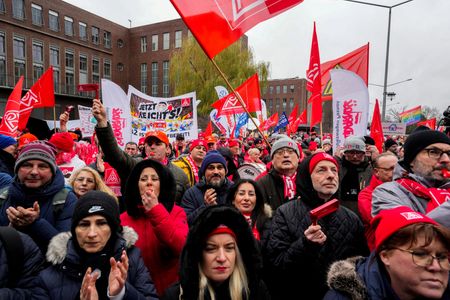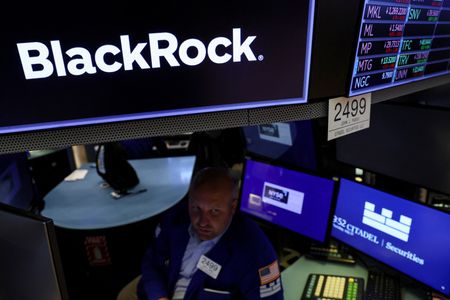By Christoph Steitz and Tom Käckenhoff
FRANKFURT/DUESSELDORF (Reuters) – Germany faces major labour disputes in 2025, as an established bond between firms and workers — long seen as a pillar of the country’s economic success — is starting to unravel in the wake of brutal competition, economic weakness and spiralling costs.
Labour bosses at industrial giants Bosch, Thyssenkrupp ZF Friedrichshafen and Volkswagen – jointly representing more than half a million German workers – say that firms are showing a new level of determination to cut jobs, close factories and move staff abroad.
Unlike during previous crises, boards are less willing to compromise and in some cases have unilaterally ended wage agreements or broken off talks with workers, according to more than a dozen interviews with labour representatives, politicians, executives and economists in Germany.
That’s due to the poor health of Europe’s top economy, which has shrunk for the second consecutive year and staked much of its reputation on labour- and energy-intensive sectors such as cars and chemicals. Germany is now one of the world’s highest-cost countries.
This has raised the question of whether Germany’s legally-enshrined principle of “co-determination”, which guarantees a major influence for workers on company’s supervisory boards, is becoming a liability by slowing down corporate restructuring.
Answering this will be high on the agenda of Germany’s next government, to be determined in a snap election on February 23.
“We have to brace for a year of disputes,” said Knut Giesler, deputy chairperson of Thyssenkrupp’s steel unit and head of the powerful IG Metall union in North Rhine-Westphalia, where the group is based.
He said Germany was currently experiencing a battle over co-determination, including at Thyssenkrupp where management and workers are clashing over plans to cut or outsource 11,000 jobs – around 11% of its workforce.
Giesler said steel workers could quickly go into dispute mode by freeing themselves from no-strike deals established under current labour pacts.
“The search for co-determination-free zones and the lowest labour costs is booming,” said Achim Dietrich, head of the works council at automotive supplier ZF Friedrichshafen, which may close around a third of its German plants and cut more than a quarter of German jobs.
“Some (executives) believe it is necessary to cut off an arm in order to save the rest of the body,” he said, adding the current situation was far worse than the 2008 financial crisis, when company leaders had been more open to compromise.
‘FULLY COLLAPSED’
Economic change is already affecting German unions, with data from the Hans-Boeckler Foundation showing the number of unrepresented workers in Germany’s largest companies has risen by around 14% since 2019.
Germany’s top unions IG Metall and Verdi have both seen their membership decline by a respective 8% and 6% since 2016.
While unions say they are not in denial about the state of the economy, with insolvency numbers hitting their highest level in nearly a decade, they accuse boards of exploiting the current situation to push through radical change.
That also includes Bosch, the world’s biggest auto supplier, which is planning to cut around 3,800 jobs in Germany.
“Talks have fully collapsed since summer,” said Axel Petruzzelli, who leads the works council at Bosch’s Stuttgart plant, its largest globally, adding unions had put forward proposals in order to avoid job cuts.
“There is no feedback, there are no conversations. (Management) doesn’t want to talk,” he added, saying workers would stage more actions in the near future.
Bosch said it would honour existing agreements with labour representatives, including avoiding forced layoffs.
ZF Friedrichshafen said it remained committed to co-determination, while Thyssenkrupp referred to comments by CEO Miguel Lopez last month that fair cooperation with labour remained critical.
Volkswagen had no immediate comment on its approach to labour relations.
All companies have noted the increased need for deeper structural reform in light of overcapacity and intensifying competition from abroad.
Germany’s car production has fallen 28% since 2016 to 4.1 million last year, while jobs in the auto sector declined by just 4%, according to data from industry association VDA and the country’s statistics office.
Mona Neubaur, Economy Minister of North Rhine-Westphalia, Germany’s most populous state, has called the deepening conflict between labour and companies an “extreme burden”, urging firms to embrace cooperation with their employees.
Two senior executives, who declined to be named, said that strong unions made it more difficult for companies to implement deeper structural changes and that prolonged walkouts were an effective way to force management to budge.
Statistics from Germany’s Labour Agency show that German companies were hit by nearly 600,000 days of strikes in 2023, more than double the year before and the highest level since 2015.
And while numbers for 2024 are not yet in, far-reaching walkouts at Lufthansa, Deutsche Bahn and Volkswagen alone have cost the companies nearly 800 million euros ($829 million) last year.
Given Germany’s economy is expected to remain weak — with economists forecasting GDP growth of 0.2% at best in 2025 — firms and unions are being forced to relearn how to restructure using job cuts, said Hagen Lesch of the IW economic institute in Cologne.
“It is becoming increasingly expensive to keep jobs that are no longer needed.”
($1 = 0.9649 euros)
(Reporting by Christoph Steitz in Frankfurt and Tom Kaeckenhoff in Duesseldorf; Additional reporting by Ilona Wissenbach and John O’Donnell in Frankfurt, Matthias Inverardi in Duesseldorf and Rene Wagner in Berlin; editing by Matthias Williams and Toby Chopra)















